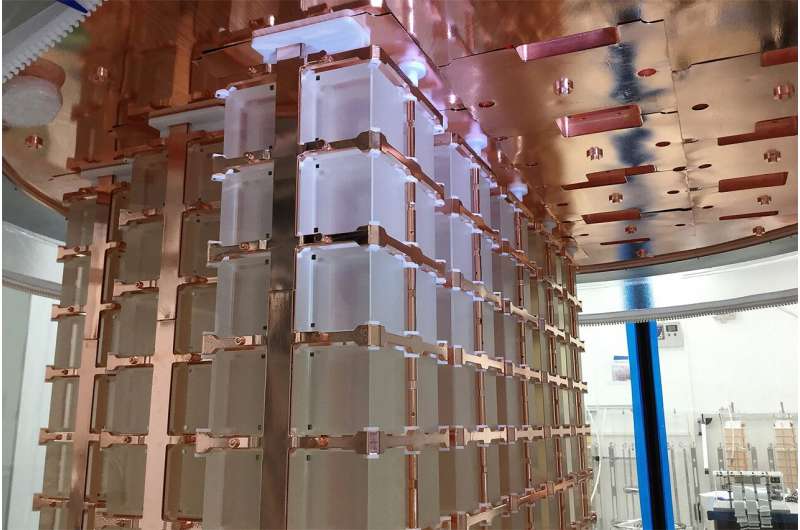Science
Researchers Enhance Search for Neutrinoless Double Beta Decay

Deep beneath the Italian mountains, researchers at the **Cryogenic Underground Observatory for Rare Events (CUORE)** have made significant strides in the quest to identify a rare nuclear decay process known as **neutrinoless double beta decay**. This experiment, involving scientists from **Yale University**, has compiled an impressive dataset equivalent to two ton-years, helping to probe a concept that could challenge the **Standard Model of Particle Physics**.
Neutrinoless double beta decay is theorized to occur when two neutrons in an atom transform into protons without emitting any antineutrinos, suggesting that neutrinos may be their own antiparticles. In a recent publication in the journal **Science**, CUORE researchers established that this decay process occurs no more than once every **50 septillion years**, a staggering **trillion trillion years**.
The researchers employed a newly developed algorithm designed to minimize extraneous vibrational noise that could interfere with their measurements. This noise includes vibrations from everyday activities, such as conversations and natural occurrences like ocean waves and earthquakes. According to **Reina Maruyama**, a professor of physics and astronomy at Yale and a CUORE member, the focus of this recent data release was on understanding these external vibrations to enhance the search for this elusive decay.
CUORE is situated in the **Gran Sasso National Laboratory**, which is shielded beneath nearly a mile of rock and surrounded by lead ingots salvaged from a 2,000-year-old Roman shipwreck. Despite these protective measures, some vibrational noise penetrates, necessitating the implementation of advanced noise-cancelling strategies.
The team has installed over two dozen sensors to monitor temperature, sound, vibrations, and electrical interference near the detector. By correlating sensor data with recorded activity, scientists can identify and disregard noise, thus refining their measurements. This algorithm has been applied to both new and previously collected data, further enhancing the experiment’s reliability.
The CUORE initiative, which began operations in 2017 under the leadership of the **U.S. Department of Energy’s Lawrence Berkeley National Laboratory**, involves collaboration among more than 20 research institutions, including Yale. Data collection will continue throughout 2025, after which the project will transition to its successor, known as the **CUORE Upgrade with Particle Identification (CUPID)**. This next phase will incorporate improved light sensors and utilize enriched molybdenum crystals instead of tellurium to enhance event identification and background discrimination.
Detecting neutrinoless double beta decay could provide crucial insights into the nature of neutrinos, suggesting they are **Majorana particles** and potentially explaining the observed imbalance between matter and antimatter in the universe. **Karsten Heeger**, the Eugene Higgins Professor of Physics at Yale and director of Yale’s **Wright Laboratory**, emphasized that such a discovery would violate a fundamental principle of the Standard Model, specifically the conservation of lepton number, and would provide compelling evidence for new physics.
Yale researchers contribute significantly to both CUORE and CUPID, working on various aspects of the experiments, including low-energy analysis and reducing muon-induced backgrounds. Key team members include research scientist **Penny Slocum**, postdoctoral researcher **Tyler Johnson**, and engineer **James Wilhelmi**, along with graduate students **Ridge Liu**, **Maya Moore**, and **Zach Muraskin**.
This collaborative effort reflects a commitment to unraveling one of the most profound mysteries of particle physics, with implications that could reshape our understanding of the universe. More details on the study can be found in the publication “Constraints on lepton number violation with the 2 tonne·year CUORE Dataset” in **Science**.
-

 Health2 months ago
Health2 months agoNeurologist Warns Excessive Use of Supplements Can Harm Brain
-

 Health2 months ago
Health2 months agoFiona Phillips’ Husband Shares Heartfelt Update on Her Alzheimer’s Journey
-

 Science5 days ago
Science5 days agoBrian Cox Addresses Claims of Alien Probe in 3I/ATLAS Discovery
-

 Science3 days ago
Science3 days agoNASA Investigates Unusual Comet 3I/ATLAS; New Findings Emerge
-

 World2 months ago
World2 months agoCole Palmer’s Cryptic Message to Kobbie Mainoo Following Loan Talks
-

 Entertainment3 months ago
Entertainment3 months agoEmmerdale Faces Tension as Dylan and April’s Lives Hang in the Balance
-

 Entertainment3 months ago
Entertainment3 months agoLove Island Star Toni Laite’s Mother Expresses Disappointment Over Coupling Decision
-

 Entertainment3 months ago
Entertainment3 months agoKerry Katona Discusses Future Baby Plans and Brian McFadden’s Wedding
-

 Entertainment2 months ago
Entertainment2 months agoMajor Cast Changes at Coronation Street: Exits and Returns in 2025
-

 World2 months ago
World2 months agoCoronation Street’s Asha Alahan Faces Heartbreaking Assault
-

 Lifestyle2 months ago
Lifestyle2 months agoEngland Flags Spark Controversy This Summer: A Cultural Debate
-

 Entertainment2 weeks ago
Entertainment2 weeks agoStefan Dennis and Dianne Buswell Share Health Update on Strictly Come Dancing









